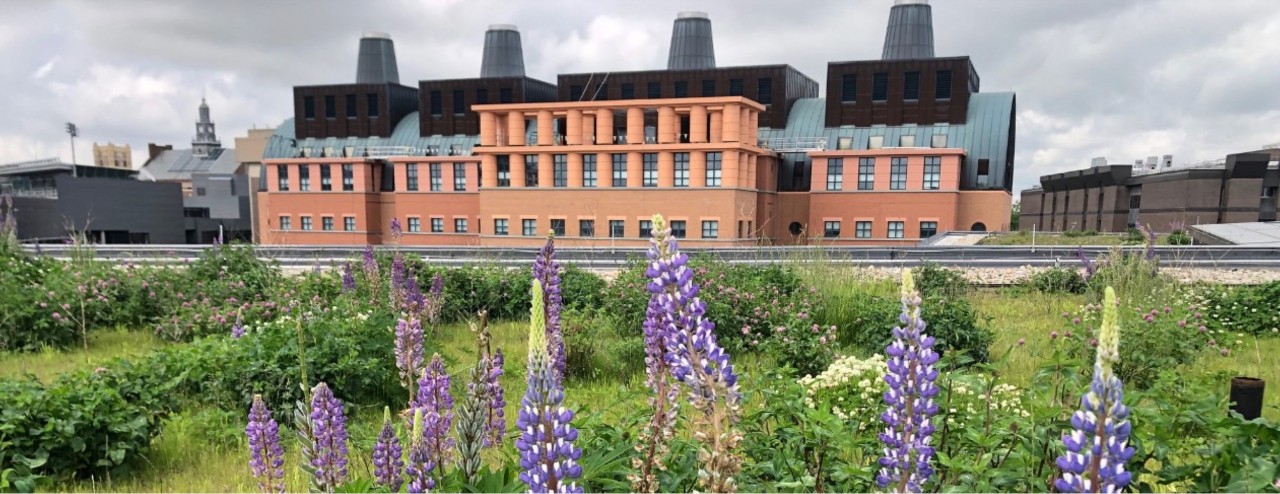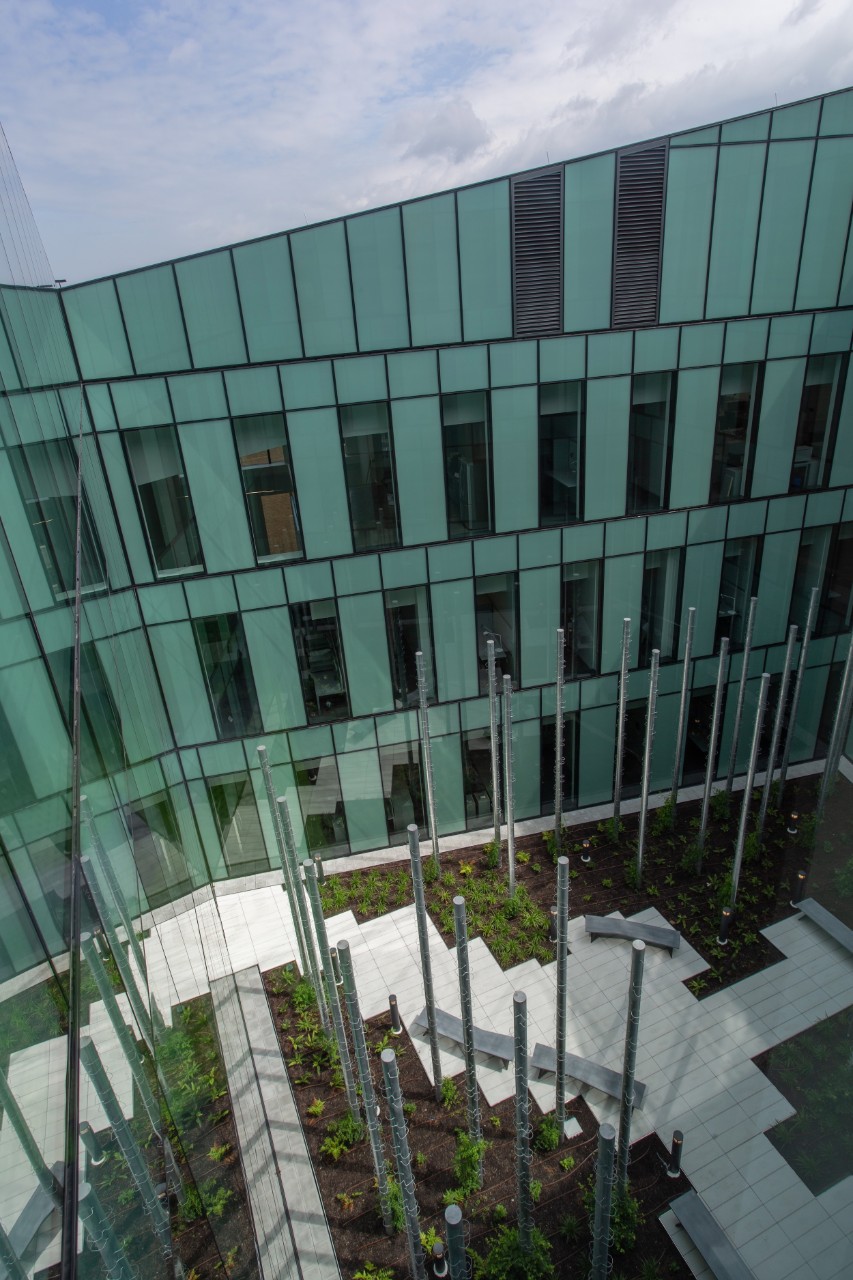
Earth Day is every day for UC sustainability stewards
New buildings, campus programs and award-winning infrastructure put UC at the top of sustainability
Uptown campus at the University of Cincinnati is known as one of the most beautiful college campuses across the globe but her beauty is more than skin deep.
“Incorporated into all new campus construction, UC seeks to consider the environmental, social and economic impacts of its decisions,” says Daniel Hart, sustainability coordinator in the Department of Planning + Design + Construction. “Our award-winning buildings and landscapes are designed to reduce their environmental impact by creating sustainable systems.
“And we continue to incorporate the concept of sustainability into our academic and research programs across the institution.”
Until 50 years ago, it was legal for industry to spew black clouds of toxic smoke into the air or dump tons of toxic waste into nearby waterways. But in April 1970, U.S. Sen. Gaylord Nelson created Earth Day to force this issue into the national agenda. After successful demonstrations across the country, later that year Congress authorized the creation of the U.S. Environmental Protection Agency to tackle environmental issues.
Today, a growing group of sustainability stewards all across UC’s campus continue to carry out the original Earth Day mission: from awareness to action.
Earth Day activism

UC's Carl H. Lindner College of Business
With national Earth Day celebrated on April 22, events across all four UC campuses are bringing that awareness to green energy initiatives and improved built environment. Currently, 15 campus buildings hold at least silver LEED (Leadership in Energy and Environmental Design) certification — the nationally accepted benchmark for the design, construction and operation of high performance “green” buildings. The recently rebuilt Carl H. Lindner College of Business holds LEED gold because of its green roof, bioswale water diversion and reuse system and high-quality thermal UV-rated windows, just to name a few.
“UC was awarded $30,000 in grant funding from the Ohio EPA to build upon our efforts of putting connected landfill and recycling stations throughout our buildings, making it easier for people to recycle,” adds Hart. “We also joined the Green Sports Alliance program this year, pledging our support of sustainability through athletics.”
Programs across campus that enhance the use of recycling practices, local sourcing of foods and healthy living initiatives such as campus pollinator gardens and UC’s Bike Share program are all highlighted among the Earth Day events that run throughout the month of April — culminating with the winners of this year’s Sustainability Awards Program.
Green innovation gets the gold
UC Sustainability Awards, presented to a top student, faculty and staff member, as well as a research initiative that promotes sustainability across campus, were all awarded during a virtual ceremony on April 15 by Tim Brown, UC industrial design alum and CEO of Allbirds, a footwear and apparel company dedicated to making the most sustainable items by using natural materials.

UC Clermont College Pollinator Garden. photo/Danny Kidd/UC Clermont Marketing Services
Recognized for their innovation, impact, practicality, inclusion and for building a culture of sustainability, the 2022 awards were presented to:
- faculty member Andrew Bernier, a visiting assistant professor of STEM education in UC’s College of Education, Criminal Justice, and Human Services, was recognized for focusing his work on how to design, integrate and amplify sustainability into teacher preparation, particularly to new teachers serving in urban environments. Faculty are awarded for their dedication to creating a strong commitment to sustainability through teaching and/or service.
- Staff member Kevin Peck, associate director of maintenance operations at UC Clermont and UC Blue Ash colleges, was awarded for demonstrating an exemplary commitment to the enhancement of UC as a living laboratory and to integrating sustainability into UC’s operations. Peck was instrumental in securing funding for and supporting the Clermont College Pollinator Garden created in 2021.
- Student Mitchell Singstock, a medical student in UC’s College of Medicine and president of the Medical Student Sustainability Club, was awarded for his leadership and innovative ways of solving problems to enhance UC’s culture of sustainability. Singstock hosted speakers on the implications of climate change on patient’s health and for designing creative ways UC College of Medicine can be more sustainable.
- Carrie Trott was recognized for outstanding research innovation for her dedication to cultivating a culture of sustainability at UC and beyond. Trott, a community psychologist and UC assistant professor of social and community psychology, co-authored the “2021 Cincinnati Climate Equity Indicators Report.” The report presents research into 52 Cincinnati neighborhoods, detailing climate factor inequities and suggesting actions to rectify them. The report, hosted on the Office of Environment and Sustainability website, is a collaboration between the city, UC, residents and community partners including Green Umbrella and Groundwork Ohio River Valley.
Climate action at work
UC’s Sustainability + Climate Action Plan continues to incorporate, promote and support sustainable behaviors, including those around climate change into academic classes and programs.
Among the efforts is UC’s Food Waste Prevention’s program to recycle coffee grounds and food waste. By integrating a food waste tracking system called LeanPath into campus dining halls and food courts, UC helps reduce pre-consumer waste as the staff prepares food.
“Using LeanPath technology, we have measured and reduced food waste in CenterCourt and MarketPointe@Siddall dining centers by 65% since 2017,” says Katy Wahlke, director of food services in UC’s Campus Services. “Two dining centers are also composting post-consumer organic food waste that may be generated from uneaten food.
“We also purchase produce for the salad bar for On the Green food court from the locally grown 80 Acres Farms.”
A novel Sustainable Invention Immersion Week brought new interdisciplinary student and faculty teams together to connect design and innovation to the science of sustainability. By the end of the week, teams learned to:
- apply user-centered design
- use the principles of green chemistry and life cycle thinking to design a sustainable product
- communicate a product’s message and company’s values through digital storytelling
- construct a viable business model with an identified target market while developing an effective sales pitch
Since publishing the first Climate Action Plan in 2009, UC's Clermont College campus continues to be recognized for its use of green wind energy and the resulting savings from the U.S. EPA’s Green Power Partnership Recognition program.
And, to support UC's mission, vision and commitment to enhancing resiliency in a future that is sustainable for all, UC Utilities has developed and launched an initial Utilities Sustainability Master Plan as an effective roadmap for achieving those long-term goals and strategies.
PACES (the President’s Advisory Council on Environment and Sustainability), UC’s all-university sustainability committee open to all staff, students and faculty, continues to lead the way toward sustainable efforts that impact behaviors now and into the future. PACES meets once a month during the fall and spring semesters and is a great place to network with others. For the team's link, email Green@uc.edu.
James Mack, UC professor of chemistry and chief executive officer of the Venture Lab-backed startup Cinthesis, helped develop a new method of chemistry to make a wide range of products such as agriculture, pharmaceuticals and plastics more environmentally friendly. This process reduces waste and the need for using volatile organic compounds that are harmful to the environment, says Mack in an earlier news story.
While innovators like Mack and his partners eliminate toxic solvents in the emerging field of mechanochemistry, others across campus also find UC the place to be for working on solutions today for a sustainable impact on tomorrow.
Featured image at top: Native Ohio plants on UC LCOB's green rooftop serve as a pollinator garden on campus. Photo/Andrew Higley/UC Creative + Brand
UC | Sustainability
UC Sustainability represents the diverse and interdisciplinary sustainability movements at the University of Cincinnati. UC recognizes its role as a leader in sustainable practice, research and education and seeks to consider the environmental, social and economic impacts of its decisions. The university commits to incorporating the concept of sustainability into its academic and research programs, the design, operation and maintenance of its buildings and landscapes and its organizational structure and management.
Next Lives Here
The University of Cincinnati is leading public urban universities into a new era of innovation and impact. Our faculty, staff and students are saving lives, changing outcomes and bending the future in our city's direction. Next Lives Here.
Take a UC virtual visit and begin picturing yourself at an institution that inspires innovation, sustainability and incredible stories.
Related Stories
UC-linked startups blaze trails as Cincy Inno Fire Awards...
May 5, 2025
Seven of the 22 finalists for the Cincy Inno Fire Awards have connections to the University of Cincinnati. We’ll run through each of these trailblazing startups.
‘Doing Good Together’ course gains recognition
May 1, 2025
New honors course, titled “Doing Good Together,” teaches students about philanthropy with a class project that distributes real funds to UC-affiliated nonprofits. Course sparked UC’s membership in national consortium, Philanthropy Lab.
DAAPworks reveals 2025 Innovation Awards – discover the winning...
May 1, 2025
Visionary projects stole the show during DAAPworks 2025, from wayfinding technology for backcountry skiers to easy-to-use CPR training kits for children.

